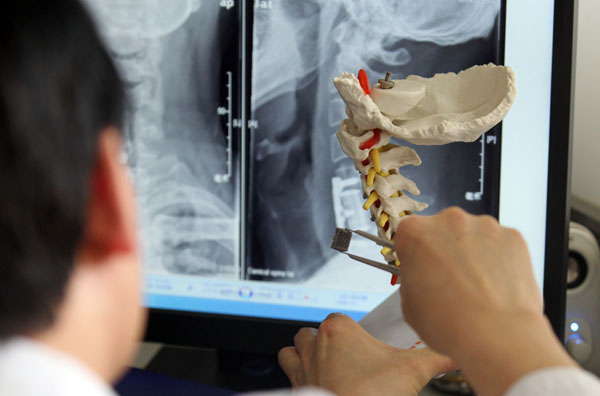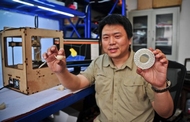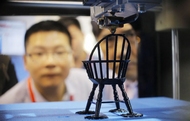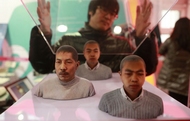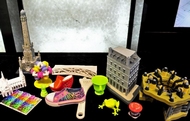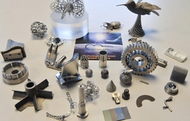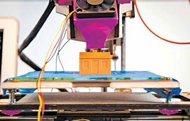Information and news about China 3D print enterprises, 3-D print technology trend setters, consumer electronics, gadgets, geek stories, videos and photos about product reviews, fashion design, lifestyle and international tech events from China Daily and China Daily website.
Hospital uses 3D printed orthopedic implants
Updated: 2013-08-06 19:19Due to the limits of traditional engineering methods, the shapes of orthopedic implants used nowadays are usually geometric patterns and, as a result, cannot attach to bones firmly without additional cement, screws or fixing plates.
But 3-D printing can virtually produce implants in any shape, as long as the computer that controls the printer has a digital model to follow.
Thus, such implants match better with the bones around them than traditional ones.
Also, through tiny pores Liu's team deliberately made in the new implants, bones are able to grow into the implants, securing the implant.
In this aspect, 3-D printed implants are more reliable than traditional ones,” Liu said.
"Although the probability is very low, yet it is possible that under long-term pressure from inside the body, traditional implants might plug into bones gradually, or become detached from bones. But there will be no such problems for 3-D printed implants."
Such improvements take time.
Liu's team started its program in 2009, with a medical device company that owns an imported 3-D printer.
The medical team provided designs based on their clinical experience and understanding of surgical needs, and the company digitalized the design for printing.
In mid-2010, they finally produced the implants they wanted and started animal trials on sheep.
When the animal trials proved the implants were safe and useful, the team applied to health authorities for permission for human trials.
In late 2012, they launched clinical trials.
Liu said 3-D printing has been applied a lot for aeronautics and astronautics, but more needs to be done in the medical field.
Zhang Weiping, the technology director with the medical device company, agreed.
Related Readings:
-
 4th World Internet Conference concludes
4th World Internet Conference concludes
-
 Starbucks Reserve Roastery set to open in Shanghai
Starbucks Reserve Roastery set to open in Shanghai
-
 Smile to get discounts in Tmall's unmanned supermart
Smile to get discounts in Tmall's unmanned supermart
-
 Top 10 richest Chinese women in 2017
Top 10 richest Chinese women in 2017
-
 World leading internet sci-tech achievements released in Wuzhen
World leading internet sci-tech achievements released in Wuzhen
-
 Top tech CEOs take to the stage as Wuzhen Summit opens
Top tech CEOs take to the stage as Wuzhen Summit opens
-
 Major topics at 4th World Internet Conference
Major topics at 4th World Internet Conference
-
 'Made in China' dinosaurs amuse the world
'Made in China' dinosaurs amuse the world
-
 China's internet industry: Racing ahead on superhighway
China's internet industry: Racing ahead on superhighway
-
 Robots come to town, again
Robots come to town, again
- ...
-
 Top 10 brands most relevant to China's Generation-Y
Top 10 brands most relevant to China's Generation-Y
-
 Top 5 women billionaires in tech in 2016
Top 5 women billionaires in tech in 2016
- ...
-
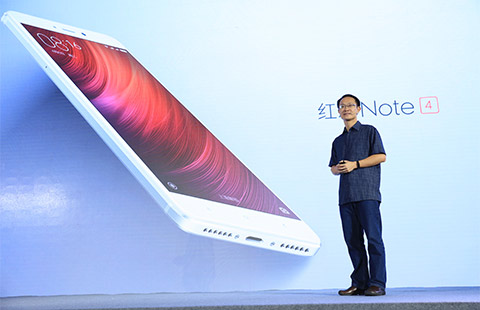 Xiaomi and China Mobile launch new Redmi Note 4 with hopes channels boost sales
Xiaomi and China Mobile launch new Redmi Note 4 with hopes channels boost sales
-
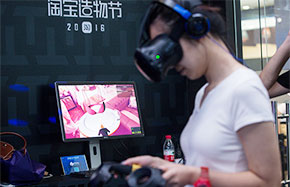 E-shopper experience to go high-tech with Buy+
E-shopper experience to go high-tech with Buy+



